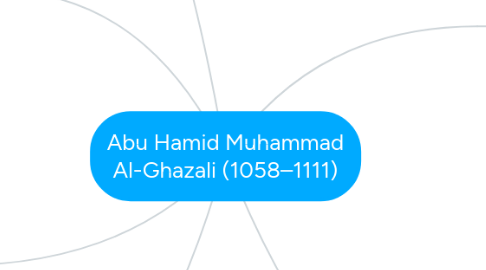
1. The Qalb (heart): controls and rules over all other powers
1.1. appetite
1.2. anger
1.3. impulse
1.4. apprehension
1.5. intellect
1.5.1. Aql (intellect)
1.5.1.1. Intellect is the fundamental rational faculty, which enables man to generalize and form concepts and gain knowledge.
1.6. will
1.6.1. Irada (will)
1.6.1.1. Intellect is the fundamental rational faculty, which enables man to generalize and form concepts and gain knowledge.
2. Knowledge
2.1. innate
2.2. acquired
2.2.1. through imitation, logical reasoning, contemplation and/or intuition.
2.2.1.1. phenomenal (material world)
2.2.1.2. spiritual (God, soul, etc.)
3. Nafs
3.1. Nafs Ammarah (12:53)
3.1.1. that exhorts one to freely indulge in gratifying passions and instigates to do evil
3.2. Nafs Lawammah (75:2)
3.2.1. the conscience that directs man towards right or wrong
3.3. Nafs Mutmainnah (89:27)
3.3.1. a self that reaches the ultimate peace.
4. diseases
4.1. physical
4.2. spiritual
4.2.1. Spiritual diseases are more dangerous and result from ignorance and deviation from God
4.2.1.1. self-centeredness, addiction to wealth, fame and status, ignorance, cowardice, cruelty, lust, doubt (waswas), malevolence, calumny, envy, deceit, avarice
5. Self
5.1. Sensory Motives: Apprehension
5.1.1. External Motives
5.1.1.1. Sight
5.1.1.2. Hearing
5.1.1.3. touch
5.1.1.4. smell
5.1.1.5. Taste
5.1.2. Internal Motives: Have no special organs but are located in different parts of the brain
5.1.2.1. imagination (Takhayyul)
5.1.2.1.1. enables man to retain image from experience
5.1.2.2. common sense (Hiss Mushtarik)
5.1.2.2.1. it synthesizes sensuous impressions carried to the brain while giving meaning to them
5.1.2.3. reflection (Tafakkur)
5.1.2.3.1. brings together relevant thoughts and associates or dissociates them as it considers fit
5.1.2.4. recollection (Tadhakkur)
5.1.2.4.1. remembers the outer form of objects as in memory
5.1.2.5. memory (Hafiza)
5.1.2.5.1. impressions received through the senses that are stored in the memory.
5.2. Motor Motives
5.2.1. Propensities
5.2.1.1. Appetite
5.2.1.1.1. Hunger
5.2.1.1.2. Thirst
5.2.1.1.3. Sexual Craving
5.2.1.2. Anger
5.2.1.2.1. Rage
5.2.1.2.2. Indignation
5.2.1.2.3. Revenge
5.2.2. Impulses: Move the organs to fulfill the propensities.
5.2.2.1. Muscles
5.2.2.2. Nerves
5.2.2.3. Tissues

